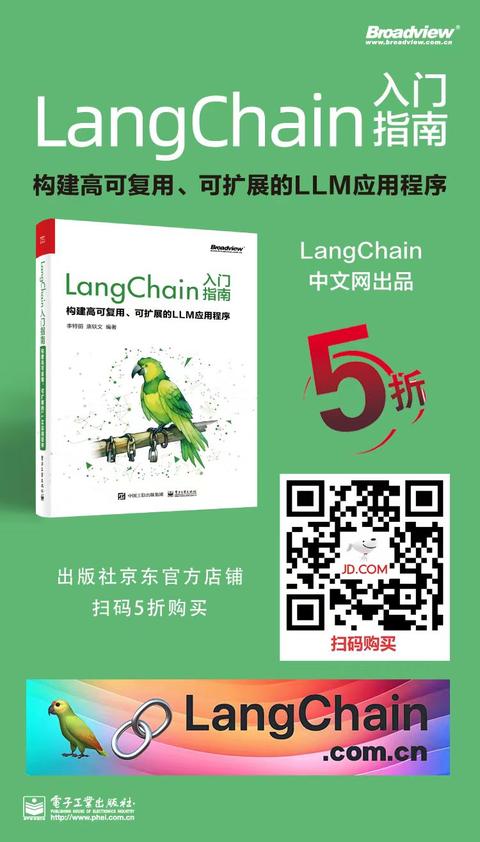如何创建自定义文档加载器
概述
基于大型语言模型(LLMs)的应用程序通常涉及从数据库或文件(如PDF)中提取数据,并将其转换为LLMs可以使用的格式。在LangChain中,这通常涉及创建文档对象(Document),它封装了提取的文本(page_content)以及元数据——一个包含有关文档的详细信息的字典,例如作者的姓名或出版日期。
Document对象通常被格式化为提示词,输入到LLM中,使LLM能够使用Document中的信息生成所需的响应(例如,总结文档)。
Documents可以立即使用,也可以索引到向量存储中以便将来检索和使用。
文档加载的主要抽象是:
| 组件 | 描述 |
|---|---|
| 文档 | 包含文本和元数据 |
| 基础加载器 | 用于将原始数据转换为Documents |
| Blob | 二进制数据的表示,位于文件或内存中 |
| BaseBlobParser | 解析 Blob 的逻辑,以生成 Document 对象 |
本指南将演示如何编写自定义文档加载和文件解析逻辑;具体来说,我们将看到如何:
- 通过从
BaseLoader子类化来创建标准文档加载器。 - 使用
BaseBlobParser创建解析器,并将其与Blob和BlobLoaders一起使用。这在处理文件时特别有用。
标准文档加载器
文档加载器可以通过从 BaseLoader 子类化来实现,后者提供了加载文档的标准接口。
接口
| 方法名称 | 说明 |
|---|---|
| lazy_load | 用于懒加载文档,一次加载一个。用于生产代码。 |
| alazy_load | lazy_load的异步变体 |
| load | 用于急加载所有文档到内存中。用于原型设计或交互式工作。 |
| aload | 用于急加载所有文档到内存中。用于原型设计或交互式工作。于2024-04添加到LangChain。 |
load方法是一个便利方法,仅用于原型设计工作 -- 它只是调用list(self.lazy_load())。alazy_load有一个默认实现,将委托给lazy_load。如果您使用异步,我们建议覆盖默认实现并提供原生异步实现。
实现文档加载器时不要通过lazy_load或alazy_load方法提供参数。
所有配置预计通过初始化器(init)传递。这是LangChain做出的设计选择,以确保一旦实例化文档加载器,它就拥有加载文档所需的所有信息。
实现
让我们创建一个标准文档加载器的示例,该加载器加载一个文件并从文件中的每一行创建一个文档。
<!--IMPORTS:[{"imported": "BaseLoader", "source": "langchain_core.document_loaders", "docs": "https://python.langchain.com/api_reference/core/document_loaders/langchain_core.document_loaders.base.BaseLoader.html", "title": "How to create a custom Document Loader"}, {"imported": "Document", "source": "langchain_core.documents", "docs": "https://python.langchain.com/api_reference/core/documents/langchain_core.documents.base.Document.html", "title": "How to create a custom Document Loader"}]-->
from typing import AsyncIterator, Iterator
from langchain_core.document_loaders import BaseLoader
from langchain_core.documents import Document
class CustomDocumentLoader(BaseLoader):
"""An example document loader that reads a file line by line."""
def __init__(self, file_path: str) -> None:
"""Initialize the loader with a file path.
Args:
file_path: The path to the file to load.
"""
self.file_path = file_path
def lazy_load(self) -> Iterator[Document]: # <-- Does not take any arguments
"""A lazy loader that reads a file line by line.
When you're implementing lazy load methods, you should use a generator
to yield documents one by one.
"""
with open(self.file_path, encoding="utf-8") as f:
line_number = 0
for line in f:
yield Document(
page_content=line,
metadata={"line_number": line_number, "source": self.file_path},
)
line_number += 1
# alazy_load is OPTIONAL.
# If you leave out the implementation, a default implementation which delegates to lazy_load will be used!
async def alazy_load(
self,
) -> AsyncIterator[Document]: # <-- Does not take any arguments
"""An async lazy loader that reads a file line by line."""
# Requires aiofiles
# Install with `pip install aiofiles`
# https://github.com/Tinche/aiofiles
import aiofiles
async with aiofiles.open(self.file_path, encoding="utf-8") as f:
line_number = 0
async for line in f:
yield Document(
page_content=line,
metadata={"line_number": line_number, "source": self.file_path},
)
line_number += 1
测试 🧪
为了测试文档加载器,我们需要一个包含优质内容的文件。
with open("./meow.txt", "w", encoding="utf-8") as f:
quality_content = "meow meow🐱 \n meow meow🐱 \n meow😻😻"
f.write(quality_content)
loader = CustomDocumentLoader("./meow.txt")
## Test out the lazy load interface
for doc in loader.lazy_load():
print()
print(type(doc))
print(doc)
<class 'langchain_core.documents.base.Document'>
page_content='meow meow🐱 \n' metadata={'line_number': 0, 'source': './meow.txt'}
<class 'langchain_core.documents.base.Document'>
page_content=' meow meow🐱 \n' metadata={'line_number': 1, 'source': './meow.txt'}
<class 'langchain_core.documents.base.Document'>
page_content=' meow😻😻' metadata={'line_number': 2, 'source': './meow.txt'}
## Test out the async implementation
async for doc in loader.alazy_load():
print()
print(type(doc))
print(doc)
<class 'langchain_core.documents.base.Document'>
page_content='meow meow🐱 \n' metadata={'line_number': 0, 'source': './meow.txt'}
<class 'langchain_core.documents.base.Document'>
page_content=' meow meow🐱 \n' metadata={'line_number': 1, 'source': './meow.txt'}
<class 'langchain_core.documents.base.Document'>
page_content=' meow😻😻' metadata={'line_number': 2, 'source': './meow.txt'}
load() 在交互环境中,例如 jupyter notebook,可能会很有帮助。
避免在生产代码中使用它,因为急切加载假设所有内容 都可以放入内存中,这并不总是成立,特别是对于企业数据。
loader.load()
[Document(page_content='meow meow🐱 \n', metadata={'line_number': 0, 'source': './meow.txt'}),
Document(page_content=' meow meow🐱 \n', metadata={'line_number': 1, 'source': './meow.txt'}),
Document(page_content=' meow😻😻', metadata={'line_number': 2, 'source': './meow.txt'})]
处�理文件
许多文档加载器涉及解析文件。这些加载器之间的区别通常源于文件的解析方式,而不是文件的加载方式。例如,您可以使用 open 来读取 PDF 或 markdown 文件的二进制内容,但您需要不同的解析逻辑将该二进制数据转换为文本。
因此,将解析逻辑与加载逻辑解耦可能会很有帮助,这使得无论数据是如何加载的,都更容易重用给定的解析器。
BaseBlobParser
BaseBlobParser 是一个接口,接受一个 blob 并输出一个 Document 对象的列表。blob 是一种数据表示,存在于内存中或文件中。LangChain python 有一个 Blob 原语,灵感来自于 Blob WebAPI 规范。
<!--IMPORTS:[{"imported": "BaseBlobParser", "source": "langchain_core.document_loaders", "docs": "https://python.langchain.com/api_reference/core/document_loaders/langchain_core.document_loaders.base.BaseBlobParser.html", "title": "How to create a custom Document Loader"}, {"imported": "Blob", "source": "langchain_core.document_loaders", "docs": "https://python.langchain.com/api_reference/core/documents/langchain_core.documents.base.Blob.html", "title": "How to create a custom Document Loader"}]-->
from langchain_core.document_loaders import BaseBlobParser, Blob
class MyParser(BaseBlobParser):
"""A simple parser that creates a document from each line."""
def lazy_parse(self, blob: Blob) -> Iterator[Document]:
"""Parse a blob into a document line by line."""
line_number = 0
with blob.as_bytes_io() as f:
for line in f:
line_number += 1
yield Document(
page_content=line,
metadata={"line_number": line_number, "source": blob.source},
)
blob = Blob.from_path("./meow.txt")
parser = MyParser()
list(parser.lazy_parse(blob))
[Document(page_content='meow meow🐱 \n', metadata={'line_number': 1, 'source': './meow.txt'}),
Document(page_content=' meow meow🐱 \n', metadata={'line_number': 2, 'source': './meow.txt'}),
Document(page_content=' meow😻😻', metadata={'line_number': 3, 'source': './meow.txt'})]
使用 blob API 还允许直接从内存加载内容,而无需从文件中读取!
blob = Blob(data=b"some data from memory\nmeow")
list(parser.lazy_parse(blob))
[Document(page_content='some data from memory\n', metadata={'line_number': 1, 'source': None}),
Document(page_content='meow', metadata={'line_number': 2, 'source': None})]
Blob
让我们快速浏览一下 Blob API。
blob = Blob.from_path("./meow.txt", metadata={"foo": "bar"})
blob.encoding
'utf-8'
blob.as_bytes()
b'meow meow\xf0\x9f\x90\xb1 \n meow meow\xf0\x9f\x90\xb1 \n meow\xf0\x9f\x98\xbb\xf0\x9f\x98\xbb'
blob.as_string()
'meow meow🐱 \n meow meow🐱 \n meow😻😻'
blob.as_bytes_io()
<contextlib._GeneratorContextManager at 0x743f34324450>
blob.metadata
{'foo': 'bar'}
blob.source
'./meow.txt'
Blob 加载器
虽然解析器封装了将二进制数据解析为文档所需的逻辑,但 blob 加载器 封装了从给定存储位置加载 blobs 所需的逻辑。
目前,LangChain 仅支持 FileSystemBlobLoader。
您可以使用 FileSystemBlobLoader 加载 blobs,然后使用解析器对其进行解析。
<!--IMPORTS:[{"imported": "FileSystemBlobLoader", "source": "langchain_community.document_loaders.blob_loaders", "docs": "https://python.langchain.com/api_reference/community/document_loaders/langchain_community.document_loaders.blob_loaders.file_system.FileSystemBlobLoader.html", "title": "How to create a custom Document Loader"}]-->
from langchain_community.document_loaders.blob_loaders import FileSystemBlobLoader
blob_loader = FileSystemBlobLoader(path=".", glob="*.mdx", show_progress=True)
parser = MyParser()
for blob in blob_loader.yield_blobs():
for doc in parser.lazy_parse(blob):
print(doc)
break
0%| | 0/8 [00:00<?, ?it/s]
page_content='# Microsoft Office\n' metadata={'line_number': 1, 'source': 'office_file.mdx'}
page_content='# Markdown\n' metadata={'line_number': 1, 'source': 'markdown.mdx'}
page_content='# JSON\n' metadata={'line_number': 1, 'source': 'json.mdx'}
page_content='---\n' metadata={'line_number': 1, 'source': 'pdf.mdx'}
page_content='---\n' metadata={'line_number': 1, 'source': 'index.mdx'}
page_content='# File Directory\n' metadata={'line_number': 1, 'source': 'file_directory.mdx'}
page_content='# CSV\n' metadata={'line_number': 1, 'source': 'csv.mdx'}
page_content='# HTML\n' metadata={'line_number': 1, 'source': 'html.mdx'}
通用加载器
LangChain 具有一个 GenericLoader 抽象,它将 BlobLoader 与 BaseBlobParser 组合在一起。
GenericLoader 旨在提供标准化的类方法,使使用现有的 BlobLoader 实现变得简单。目前,仅支持 FileSystemBlobLoader。
<!--IMPORTS:[{"imported": "GenericLoader", "source": "langchain_community.document_loaders.generic", "docs": "https://python.langchain.com/api_reference/community/document_loaders/langchain_community.document_loaders.generic.GenericLoader.html", "title": "How to create a custom Document Loader"}]-->
from langchain_community.document_loaders.generic import GenericLoader
loader = GenericLoader.from_filesystem(
path=".", glob="*.mdx", show_progress=True, parser=MyParser()
)
for idx, doc in enumerate(loader.lazy_load()):
if idx < 5:
print(doc)
print("... output truncated for demo purposes")
0%| | 0/8 [00:00<?, ?it/s]
page_content='# Microsoft Office\n' metadata={'line_number': 1, 'source': 'office_file.mdx'}
page_content='\n' metadata={'line_number': 2, 'source': 'office_file.mdx'}
page_content='>[The Microsoft Office](https://www.office.com/) suite of productivity software includes Microsoft Word, Microsoft Excel, Microsoft PowerPoint, Microsoft Outlook, and Microsoft OneNote. It is available for Microsoft Windows and macOS operating systems. It is also available on Android and iOS.\n' metadata={'line_number': 3, 'source': 'office_file.mdx'}
page_content='\n' metadata={'line_number': 4, 'source': 'office_file.mdx'}
page_content='This covers how to load commonly used file formats including `DOCX`, `XLSX` and `PPTX` documents into a document format that we can use downstream.\n' metadata={'line_number': 5, 'source': 'office_file.mdx'}
... output truncated for demo purposes
自定义通用加载器
如果你真的喜欢创建类,你可以继承并创建一个类来封装逻辑。
你可以从这个类继承,以使用现有的加载器加载内容。
from typing import Any
class MyCustomLoader(GenericLoader):
@staticmethod
def get_parser(**kwargs: Any) -> BaseBlobParser:
"""Override this method to associate a default parser with the class."""
return MyParser()
loader = MyCustomLoader.from_filesystem(path=".", glob="*.mdx", show_progress=True)
for idx, doc in enumerate(loader.lazy_load()):
if idx < 5:
print(doc)
print("... output truncated for demo purposes")
0%| | 0/8 [00:00<?, ?it/s]
page_content='# Microsoft Office\n' metadata={'line_number': 1, 'source': 'office_file.mdx'}
page_content='\n' metadata={'line_number': 2, 'source': 'office_file.mdx'}
page_content='>[The Microsoft Office](https://www.office.com/) suite of productivity software includes Microsoft Word, Microsoft Excel, Microsoft PowerPoint, Microsoft Outlook, and Microsoft OneNote. It is available for Microsoft Windows and macOS operating systems. It is also available on Android and iOS.\n' metadata={'line_number': 3, 'source': 'office_file.mdx'}
page_content='\n' metadata={'line_number': 4, 'source': 'office_file.mdx'}
page_content='This covers how to load commonly used file formats including `DOCX`, `XLSX` and `PPTX` documents into a document format that we can use downstream.\n' metadata={'line_number': 5, 'source': 'office_file.mdx'}
... output truncated for demo purposes

